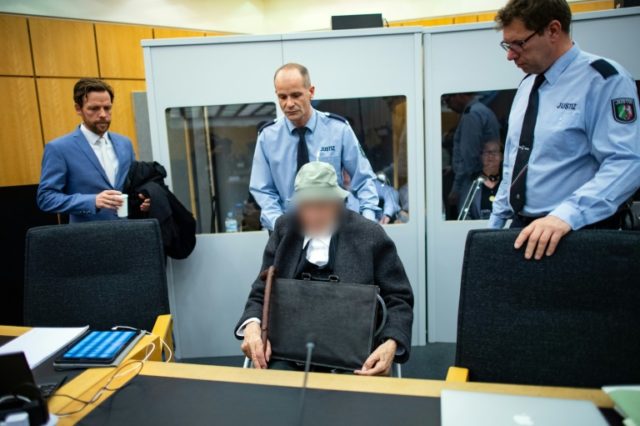Berlin (AFP) – A former SS guard, aged 94, went on trial Tuesday in Germany charged with complicity in mass murders at a Nazi concentration camp during World War II, in a case bearing symbolic and moral weight.
The man from the western district of Borken served as a watchman from June 1942 to September 1944 at the Stutthof camp near what was then the free city of Danzig, now Gdansk in Poland.
He was not publicly named by prosecutors, but Die Welt daily identified him as Johann R., a landscape architect who once worked for North Rhine-Westphalia state authorities.
The trial marks a new attempt in Germany’s race against time to prosecute surviving Nazis, after a new legal precedent was set in 2011.
Dressed in a wool suit, the accused entered the courtroom in a wheelchair, with a walking stick in his right hand.
He is accused of being an accessory to the murders of several hundred camp prisoners, the regional court of Muenster said, more than seven decades after the end of WWII.
These included more than 100 Polish prisoners gassed on June 21 and 22, 1944, as well as “probably several hundred” Jewish prisoners killed from August to December 1944 as part of the Nazis’ so-called “Final Solution”.
– ‘Gassed, shot, left to die’ –
As a watchman aged 18 to 20 at the time, he is “accused in his capacity as a guard of participating in the killing operations,” Dortmund prosecutor Andreas Brendel told AFP.
“Many people were gassed, shot or left to die of hunger,” he added.
As the guards were a crucial part of the camp system, the man “knew about the killing methods” there, said prosecutors.
But when interrogated by police in August 2017, the accused insisted he knew nothing about the atrocities in the camp, Die Welt reported.
Asked why the camp detainees were so thin, he reportedly told investigators that food was so scarce for everyone that, figuratively speaking, two soldiers could fit into one uniform.
The defendant was planning to make a statement during the course of the trial, his lawyer told national news agency DPA.
Stutthof was set up in 1939 and would end up holding 110,000 detainees, 65,000 of whom perished, according to Museum Stutthof.
The defendant was being tried before a juvenile court as he was not yet 21 at the time of the crimes.
Each court hearing will likely last for a maximum of two hours due to the defendant’s advanced age — even though, Brendel said, “mentally, he is still fit”.
If found guilty, he faces a sentence of up to 15 years in prison — even though, given his age and the possibility of an appeal, the defendant is considered unlikely to serve any time behind bars.
Brendel noted that German law has no statute of limitations on murder, but also pointed to the moral imperative to pursue the case.
“Germany owes it to the families and victims to prosecute these Nazi crimes even today. That is a legal and moral question.”
Ben Cohen, the grandson of camp survivor Judy Meisel, spoke at the trial of the catharsis that the legal process has provided her.
“Her being able to witness some of this process even from afar is a sense of closure,” he said. “To have Germany listening to her is very powerful for her.”
– ‘No exceptions’ –
Germany has been racing to put on trial surviving SS personnel, after the legal basis for prosecuting former Nazis changed in 2011 with the landmark conviction of former death camp guard John Demjanjuk.
He was sentenced not for atrocities he was known to have personally committed, but on the basis that he was a cog in the Nazis’ killing machine by serving at the Sobibor camp in occupied Poland.
German courts subsequently convicted Oskar Groening, an accountant at Auschwitz, and Reinhold Hanning, a former SS guard at the same camp, for the mass murders.
But both men, convicted at age 94, died before they could be imprisoned.
Prosecutors have also filed charges against another former SS guard at Stutthof, a 93-year-old from the city of Wuppertal.
It remains to be determined if he is fit to stand trial.
Historian Peter Schoettler underlined “an important humanitarian and legal reason” to push on with the justice process, stressing that “the rule of law should not allow for exceptions”.

COMMENTS
Please let us know if you're having issues with commenting.